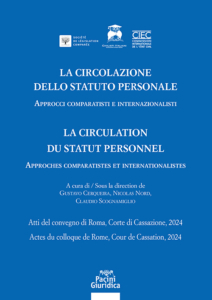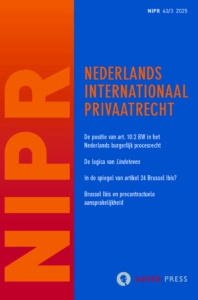Views
The Titanium Brace Tightens: Rome II and Director Liability after Wunner
By Luisa Cassar Pullicino and Krista Refalo, Ganado Advocates
In the preliminary reference Case C-77/24 Wunner (the Titanium Brace case), the CJEU was asked to determine whether a damages claim brought by a consumer directly against company directors for losses suffered from unlicensed online gambling fell within the scope of the Rome II Regulation (Regulation (EC) No 864/2007), or whether it was excluded under Article 1(2)(d) as a “non-contractual obligation arising out of the law of companies”.
The practical stakes were considerable. If Rome II applied, Article 4(1) would designate the law of the place where the damage occurred — which, for online gambling losses, would normally be the habitual residence of the consumer. If excluded, the applicable law would instead be determined by national conflict-of-laws rules, typically, the lex societatis.
‘Salami-slicing’ and Issue Estoppel: Foreign Decisions on the Governing Law
One of the requirements for issue estoppel is identity of issue. However, the process of ‘refining down’ or ‘salami-slicing’[1] is not always clear. The argument that the issue is different because the two courts would arrive at different conclusions on the governing law is increasingly being utilised as a litigation strategy. If the first court applied its choice of law rules to determine that the governing law of the claim is Utopian law, would an issue estoppel arise over this decision in the second court if under the second court’s choice of law rules, Ruritanian law is the governing law? The answer depends on whether the ‘slice’ is thick or thin. Is the relevant issue ‘What law governs the dispute or issue?’ or ‘What law is identified by our (forum) choice of law rules to govern the dispute or issue?’ Read more
The Conflict-of-Law Rules in the UAE’s New Civil Transactions Act: Yet Another Missed Opportunity!

I. Introduction
On 1 January 2026, the Legislative Decree No. 25/2025 promulgating a new Civil Transactions Act (hereafter ‘NCTA’) entered into force. The NCTA repeals and replaces the former Federal Civil Transactions Act of 1985 (hereafter ‘the 1985 Act’). The adoption of the NCTA forms part of the State’s broader and ongoing effort to comprehensively update and modernize its legal system, an effort that has already touched major legislative instruments, including, among many others, the 2022 Civil Procedure Act, the 2024 Personal Status Act, the 2023 Competition Act, and the 2022 Commercial Transactions Act.
Since the 1985 Act contained a codified set of conflict-of-laws rules, its replacement necessarily entails a re-examination of the UAE’s private international law framework and, at least in principle, the introduction of new or revised choice-of-law provisions. Against this background, this note offers a preliminary and necessarily tentative assessment of the modifications introduced by the NCTA. It focuses on the main features of the new law in relation to choice-of-law regulation, highlighting both the changes introduced and the limits of the reform. Read more
News
Virtual Workshop (in English) on February 3, 2026: Stellina Jolly on “Forging a Path for Climate Justice: Integrating Public and Private International Law in Transboundary Litigation in India”

On Tuesday, February 3, 2026, the Hamburg Max Planck Institute will host its monthly virtual workshop Current Research in Private International Law at 11:00 a.m. – 12:30 p.m. (CEST). Stellina Jolly (South Asian University) will speak, in English, about the topic
“Forging a Path for Climate Justice: Integrating Public and Private International Law in Transboundary Litigation in India”
Cross-border climate litigation, gaining traction globally, requires active engagement with private international law for effective dispute adjudication. Although Indian climate jurisprudence has not yet substantively addressed cross-border disputes, emerging trends suggest that this scenario may soon evolve. The talk analyses three plausible litigation scenarios involving Indian and foreign parties to assess the readiness of Indian private international law in addressing transboundary climate harm. Firstly, Indian plaintiffs filing cases in foreign jurisdictions against transnational corporations headquartered abroad, alleging climate-related harm caused within India; secondly, foreign plaintiffs filing cases before Indian courts for the harm caused by Indian transnational corporations in their jurisdictions; thirdly, foreign plaintiffs filing cases before Indian courts for the transboundary harm caused by Indian companies as a result of their Greenhouse gas (GHG) emissions. The talk evaluates the adequacy of Indian private international law in addressing cross-border climate cases and proposes incorporating environmental and human rights considerations in the determination of choice of law.
The presentation will be followed by open discussion. All are welcome. More information and sign-up here.
If you want to be invited to these events in the future, please write to veranstaltungen@mpipriv.de.
New Book: La circolazione dello statuto personale / La circulation du statut personnel
 A new collective volume entitled “La circolazione dello statuto personale / La circulation du statut personnel” has recently been published by Pacini Giuridica. Edited by Gustavo Cerqueira (Nice), Nicolas Nord (Strasbourg) and Claudio Scognamiglio (Rome), the book brings together the proceedings of an international conference held on 19 January 2024 in Rome, in the prestigious Giallombardo Hall of the Italian Court of Cassation. Read more
A new collective volume entitled “La circolazione dello statuto personale / La circulation du statut personnel” has recently been published by Pacini Giuridica. Edited by Gustavo Cerqueira (Nice), Nicolas Nord (Strasbourg) and Claudio Scognamiglio (Rome), the book brings together the proceedings of an international conference held on 19 January 2024 in Rome, in the prestigious Giallombardo Hall of the Italian Court of Cassation. Read more
Dutch Journal of PIL (NIPR) – issue 2025/3
The latest issue of the Dutch Journal on Private International Law (NIPR) has been published. It contains the following contributions.
NIPR 2025, Issue 3
Editorial
Mathijs ten Wolde / p. 421
Articles
Steven Stuij, De positie van art. 10:2 BW in het Nederlands burgerlijk procesrecht / p. 423-444
Abstract
Article 10:2 of the Dutch Civil Code stipulates that the rules of private international law as well as the applicable law designated by those rules are to be applied ex officio. There has been a debate as to the positioning of this provision in relation to other rules of civil procedure on party autonomy as a result of two cases of the Dutch Supreme Court (‘Hoge Raad’). This contribution will address Read more



